Drew Myron's Blog, page 48
November 20, 2014
Love that line!
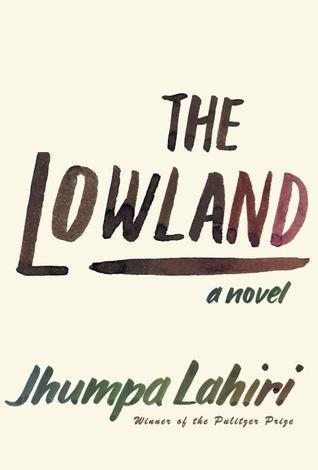
 She had a small face, with just
She had a small face, with just
enough space for what it contained.
— from The Lowland
a novel by Jhumpa Lahiri
November 15, 2014
On Sunday: Hymn
 Hymn — an erasure poem by Drew Myron
Hymn — an erasure poem by Drew Myron
Hymn
The seas are dark.
Grant us strength.
Kneel beside our panic yet again.
What are you scratching out and making new?
November 13, 2014
Thankful Thursday: Good Television?
It's raining here, and snowing there, and freezing somewhere else, maybe where you live.
On this Thankful Thursday, the weather has turned wintry and I'm snuggling up to the television. It's been years since I've watched traditional tv — sitcoms and cop dramas — and now even my cable favorites have devolved into immature skit humor (I'm talking to you, Jon Stewart).
While I read a great deal, the mind sometimes needs a break from the page, and so on this Thankful Thursday I'm grateful for smart, sharp writers who create quality viewing:
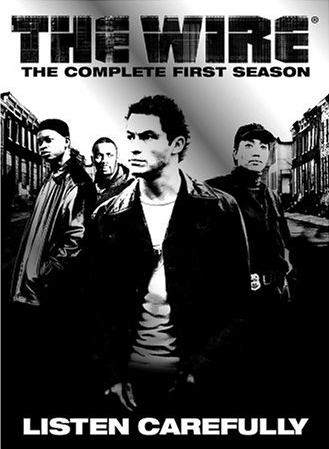
David Simon and Eric Overmyer, the writers behind The Wire and Treme, have changed my perception of what television can do. And they prove that good writing illuminates, informs and entertains.
The Wire is a crime drama series set in Baltimore, Maryland. The show centers around the city's inner-workings: the illegal drug trade, the seaport system, city government, the school system, and the print news media. Forget formulaic scripts and tired tropes; The Wire is an unusually deep and intense exploration of urban life.
Treme refers to a neighborhood in New Orleans, and this show begins three months after Hurricane Katrina as residents try to rebuild their lives, their homes, and their unique culture after one of the worst natural disasters in U.S. history. The cast is sharp, the characters complex, the music lively, and the stories unfold with skillfull nuance. With each episode I'm left a bit haunted, wondering, "Why weren't these stories told? How did we look away?"
Both shows originally aired on HBO and are now available on DVD and Amazon Prime.
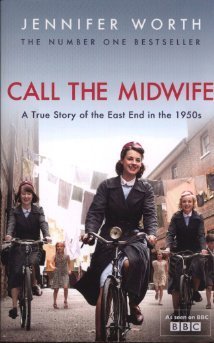
Call the Midwife is a BBC drama series about a group of nurse midwives working in the East End slums of London in the 1950s. Based on the memoirs of Jennifer Worth, the show follows young midwives who live and work alongside medically-trained nuns. Each episode reveals the gritty post-war conditions of poverty, mixed with hope in new beginnings.
The series airs on PBS and is available on Netflix.

Stories We Tell, is a movie, not a television series. This personal documentary explores family stories while showing "the truth depends on who's telling it." Writer and director Sarah Polley has been called both filmmaker and detective as she interviews family and friends to get to the truth of her mother and herself. The film is poignant and provides fresh insight into story writing and telling.
"When you're in the middle of a story, it isn't a story at all but rather a confusion," says the filmmaker's father, "a dark roaring, a blindness, a wreckage of shattered glass and splintered wood, like a house in a whirlwind or else a boat crushed by the icebergs or swept over the rapids, and all aboard are powerless to stop it. It's only afterwards that it becomes anything like a story at all, when you're telling it to yourself or someone else."
Stories We Tell is available on DVD and Netflix. (See also Sarah Polley's previous film, Away from Her, a tender film about a couple navigating Alzheimer's.)
What are you watching? And, more importantly, what are you thankful for today?
November 9, 2014
On Sunday: From the wreckage

I wonder if now when we think of “sweat and tears” in poetry what we mean by that is diligent crafting.
But there is another form of this – the experience that went into the poem in the first place, the sweat and tears of everyday living. And the sweat and tears of that which you need not search for, life experience, which seems to find you, wreck and ruin you, and then expect you to get up in the morning.
And so many people are simply at the mercy of the way the world makes them feel, they don’t need deaths or love affairs to feel a little wrecked.
— Katie Peterson
from an interview at How a Poem Happens
November 4, 2014
Please write in this book
Forget the scorn and scolding. These are the new rules: You have permission to write in books. Pick up an old book and make it new.
I love altered books — the idea of expansion, of taking one form and enlarging the canvas.
• One of my favorite works is from Karen Hatzigeorgiou, an artist creating contemporary art in the form of altered books and collage. Her work, The Art of Happiness, was created from a 1935 book of the same title. The result is a journal of striking color, collage and poetry.
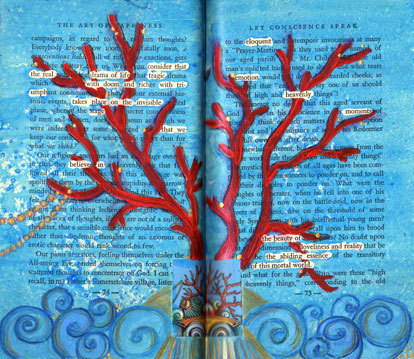 The Art of Happiness by Karen Hatzigeorgiou“The Art of Happiness is sometimes a book of sadness, disillusionment, and discontent,” she explains. “Still, it's important to note that it is also a book with an underlying current of optimism. And in that way, it has become much more of an altered book journal than I ever intended.”
The Art of Happiness by Karen Hatzigeorgiou“The Art of Happiness is sometimes a book of sadness, disillusionment, and discontent,” she explains. “Still, it's important to note that it is also a book with an underlying current of optimism. And in that way, it has become much more of an altered book journal than I ever intended.”
• Mary Ruefle creates spare and elegant erasure books that feel beautifully distilled.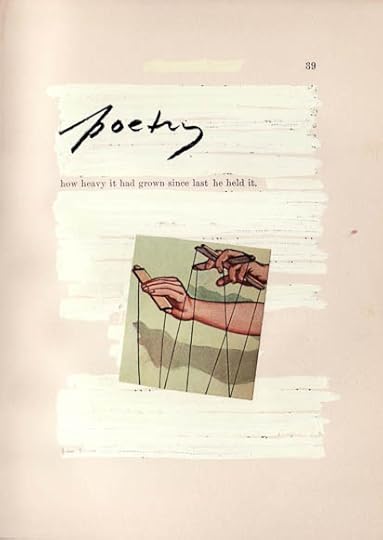 Melody: The Story of a Child by Mary Ruefle
Melody: The Story of a Child by Mary Ruefle
"I use white-out, buff-out, blue-out, paper, ink pencil, gouache, carbon, and marker," she says. "I have resisted formal poetry my whole life, but at last found a form I can’t resist. It is like writing with my eyes instead of my hands."
• Valerie Savarie is an artist reinterpreting old books with skill and precision. She uses tattered tomes as canvas and turns each into a three-dimensional piece by cutting, sewing and painting. The result is a striking layered collage that leaves most of the book intact.
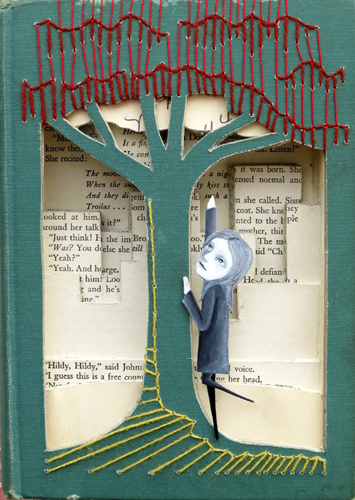 With Age Comes Greater Reach by Valerie Savarie
With Age Comes Greater Reach by Valerie Savarie
“I am adding another chapter in the lineage of storytelling," says Savarie. In the past, "stories were communicated verbally and passed on from person to person, with each storyteller adding their own twist. This is my way of passing on that tradition — creating a visual from the written and then allowing the viewer to create their own story from the images and words that they see."
Do you write in books? What altered books have caught your eye, stirred your mind?
October 30, 2014
Thankful Thursday: Nagging mothers
Gratitude. Appreciation. Praise.
Please join me in Thankful Thursday, a weekly pause to express appreciation for people, places, things and more. Joy contracts and expands in relation to our gratitude. What are you thankful for today?
 I've barely had coffee this morning when my mother is on the phone asking, "What's your Thankful Thursday?"
I've barely had coffee this morning when my mother is on the phone asking, "What's your Thankful Thursday?"
"I'm not feeling it," I say.
She blusters and I fluster and we move on to more pressing topics, such as the weather.
But she's right.
Even in the dark days, the short days, the too-hard, nothing-is-happening days, there is always something, some small thing, some big thing, some thing for which to be thankful.
And so, chin up, step up, look up.
On this Thankful Thursday, I don't like yard signs, billboards, obnoxious ads, and much of what our political system has wrought, but and yet, I am extremely grateful — giddy, even — to vote.
From city council seats to state measures to national elections, I am thankful for the right, for the privilege, to put my opinion and voice into action.
I vote, and I'm so very thankful.
October 27, 2014
Month I clung
 Drew Myron photo
Drew Myron photo
Winter arrived last weekend, already. Soaking rain and thrashing wind. The next morning the air hung still, having exhausted itself through the long night, and the night before.
This is the hangover, the weather inside me.
Last week, a neighbor died. Three suicides, three men, in less than a year. Not close friends but people with whom I waved, and talked, and said how-do. Maybe it was love or work or vague despair. Maybe they heard the low rumble of this winter ocean, the way it can echo every no.
In October
“Month I became the thorn.”
— Sandy Longhorn
Month I clung
to sun, to bird song,
to long shadows.
Month of first chill, fire
and furnace clatter.
Month of chanterelles
and decay, understory
and apples. Of early nights,
early dinner, deep sleep.
Month of soup, squash.
Month I begged
for more time, begrudged
socks, searched
mothy sweaters.
Month I reached
for bread and blades,
cursed the metallic sky,
my small heart, slow limbs,
my inability to rise.
Of false frights and deep fears.
Of grip and wish. Month of
the first long prayers.
- Drew Myron
Kestrel, Fall 2014
October 22, 2014
Find your wilderness + a free book
I've got a big appetite for books. The only thing better than reading a good book is asking friends about their favorite books.
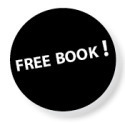 And so I started 3 Good Books.
And so I started 3 Good Books.
It's a feature on Push Pull Books (my publishing company) in which I invite writers and artists to share their favorite books. Not just any beloved book, but those on topics related to their own work.
For example, writer Lisa Romeo shares her favorite books on personal essays by women. Poet and fisherman Henry Hughes recommends books on fishing. Artist Tracy Weil suggests books related to artistic play.
Like sneaking a peek at your neighbor's medicine cabinet, or eyeing up the grocery cart of the guy in line with you at the market, we get a glimpse into the reading lives of others. With each installment, my reading list grows. And that's just the point! Because when we read, creativity stirs, and when we create, our lives expand.
This week at 3 Good Books, we're talking about wilderness and giving away a copy of the Wilderness Ranger Cookbook, a robust collection of recipes and a celebration of the 50th anniversary of the Wilderness Act. Go here to win!
Read on. Check out these previous features:
Eduardo Gabrieloff on Latino Writers
Henry Hughes on Fishing
Lee Lee on Un(Natural) Resources
Mari L'Esperance on Mixed Heritage
Reb Livingston on Oracles & Dreams
Lisa Romeo on Personal Essays by Women
Penelope Scambly Schott on Strong Women
Ann Staley on Past & Present
Hannah Stephenson on Artists
Tracy Weil on Play
Allyson Whipple on Roadtrips & Realizations
October 19, 2014
On Sunday: Beneath the din
Sometimes we go to beach church. Coffee in hand, we drive toward water and light. There, in our church without walls or rules, prayer is sometimes a poem, or, the quiet.
____
A friend says she knows the exact moment our friendship took hold. We were at the park and I shared a poem with her (A Secret Life by Stephen Dunn). And, I, too, remember the hush like an opening of trust.
____
This morning, I opened a book and went to "church," poet Mary Ruefle presiding:
Short Lecture on Prayer
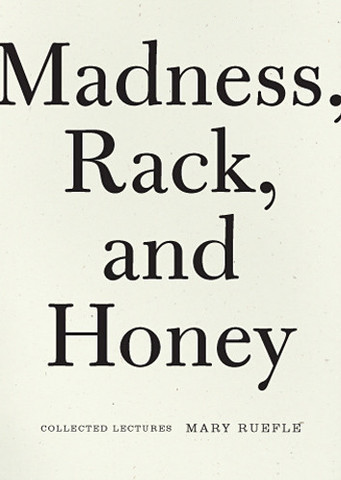 James Fenton puts forth the idea that poetry happens when one raises their voice. I agree, but I also believe that poetry happens when one lowers their voice. In the first instance, the raised voice, we have the street hawkers, the singers, the storytellers, the priests — anyone who wants to be heard over the din — but in the second we include the tellers of secrets, the lovers, the password keepers — all those who want to be heard beneath the din, not by the din itself but by one singular other who is part of the din, as when in the middle of a concert we lean to the person next to us and cup our hand around our mouth, forming a private amphitheater, a concert within a concert, connecting ourselves to one the way the concert is connection itself to everyone. And I was thinking about prayer, and those who must raise their voice in order to be heard in their emergency and desperation — O lord out of all those who are vying for your attention at this moment please hear my prayer — and I think actually those raised prayers are directed toward the gods, in the plural sense, which would be a din, the din of gods, caretakers of all the multiple things that can happen to us. But the prayer of the lowered register no longer has a chance of being heard, has abandoned that chance — "given up," we say — yet retains the desire to speak, and I think these are the prayers addressed to god, who has become a singular absence: there is no one in the next seat; the ether becomes an ear.
James Fenton puts forth the idea that poetry happens when one raises their voice. I agree, but I also believe that poetry happens when one lowers their voice. In the first instance, the raised voice, we have the street hawkers, the singers, the storytellers, the priests — anyone who wants to be heard over the din — but in the second we include the tellers of secrets, the lovers, the password keepers — all those who want to be heard beneath the din, not by the din itself but by one singular other who is part of the din, as when in the middle of a concert we lean to the person next to us and cup our hand around our mouth, forming a private amphitheater, a concert within a concert, connecting ourselves to one the way the concert is connection itself to everyone. And I was thinking about prayer, and those who must raise their voice in order to be heard in their emergency and desperation — O lord out of all those who are vying for your attention at this moment please hear my prayer — and I think actually those raised prayers are directed toward the gods, in the plural sense, which would be a din, the din of gods, caretakers of all the multiple things that can happen to us. But the prayer of the lowered register no longer has a chance of being heard, has abandoned that chance — "given up," we say — yet retains the desire to speak, and I think these are the prayers addressed to god, who has become a singular absence: there is no one in the next seat; the ether becomes an ear.
Cries and whispers. A bang or a whimper. Whatever the case, if we want to be heard, we must raise our voice, or lower it.
— Mary Ruefle
Madness, Rack, & Honey: Collected Lectures
October 13, 2014
Against Immensity
 On the beach in Yachats, Oregon. Photo by Drew Myron.
On the beach in Yachats, Oregon. Photo by Drew Myron.
I'm feeling small.
The ocean grew tall this weekend, waves curled at 10 and 15 feet. The sea was centerpiece, a beautiful low roar of large, and the sky stood steady and blue.
And later, in afternoon light, I turned east, walked deep into forest. Stood small against massive old growth stumps and gazed up to taller trees reaching for light. Sun filtered through thickness and fell on a floor of moss and fern while branches cracked beneath my feet.
Nature offers powerful reminders of perspective. I am small today, and that feels true.
Unless you
visit the dark places, you’ll never
feel the sea pull you in and under,
swallowing words before they form.
Until you visit places within you
cloistered and constant, you will travel
in a tourist daze, wrought with too much
of what endures, depletes.
If you never turn from light, close
your eyes, feel the life inside, you’ll leave
the church, the beach, your self,
knowing nothing more.
Unless you are silent, you will not
know your urgent heart, how it beats
between the thin skin of yes and no.
- Drew Myron
from Thin Skin




